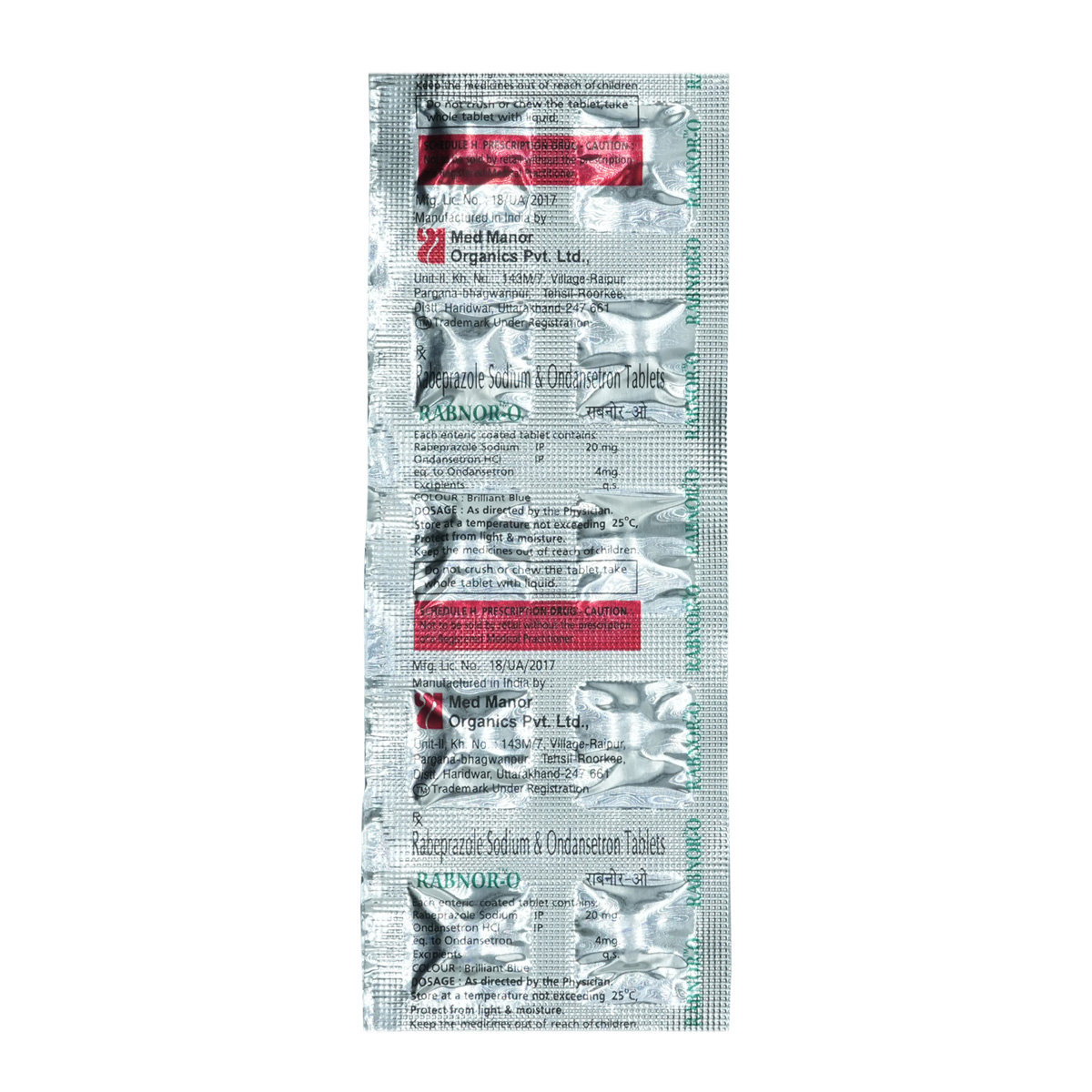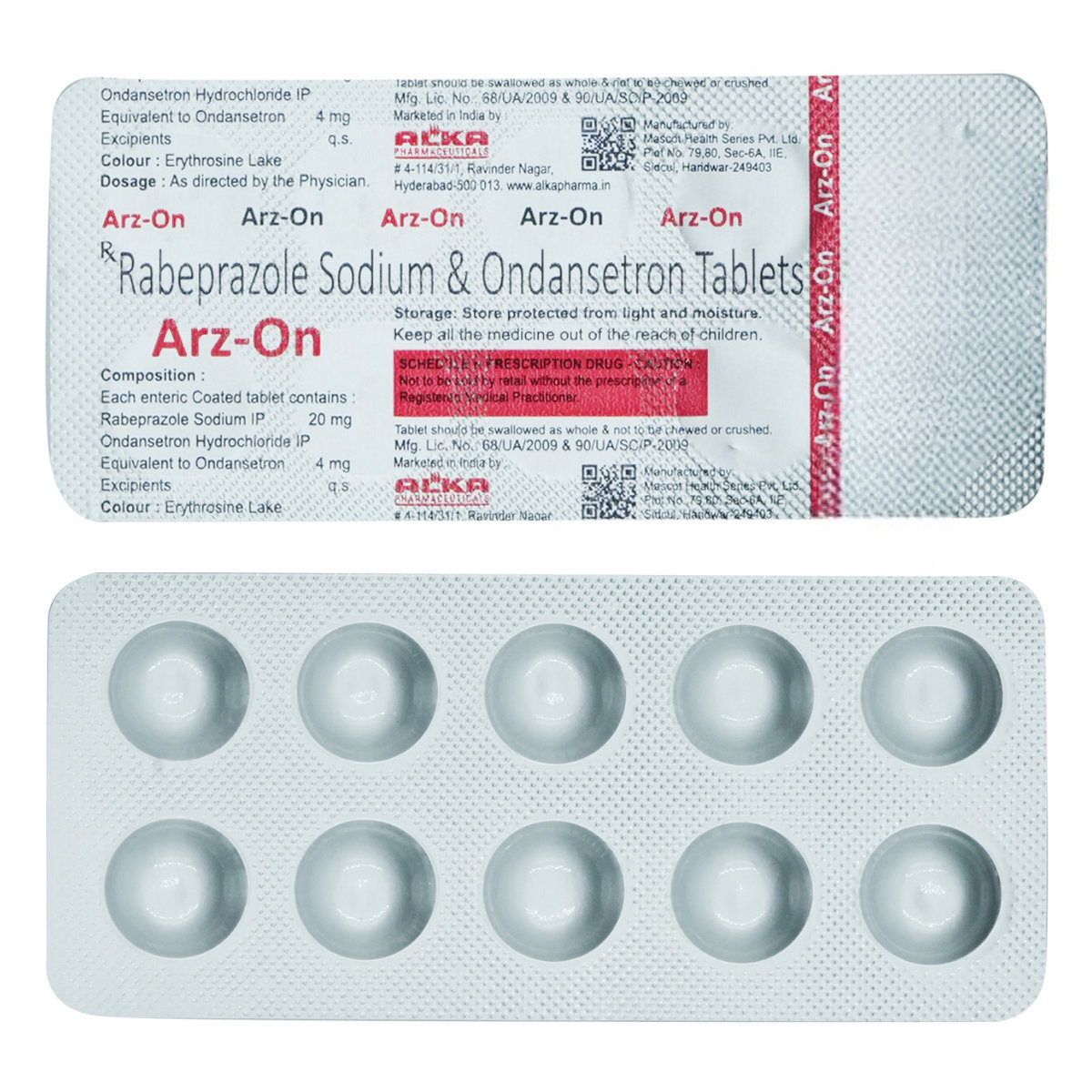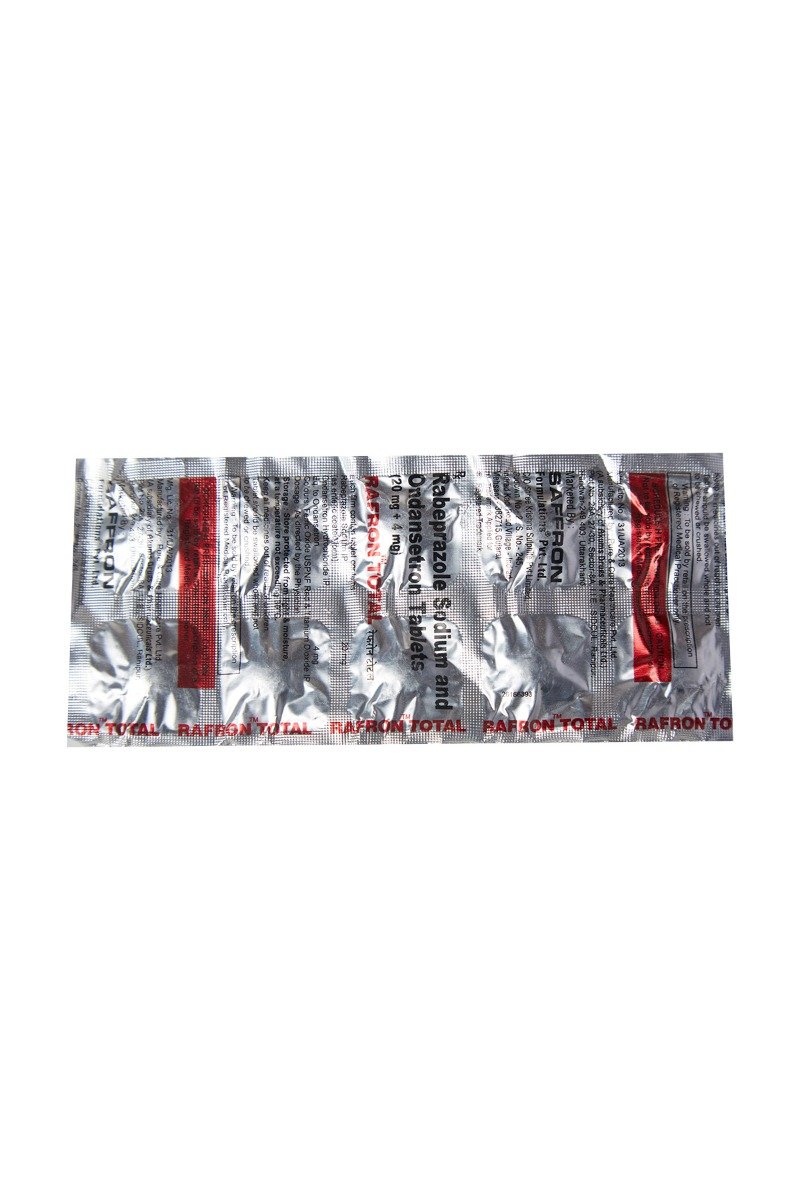Emerab Tablet 10's
MRP ₹150
(Inclusive of all Taxes)
₹22.5 Cashback (15%)
Provide Delivery Location
Online payment accepted
 Prescription drug
Prescription drugWhats That
Composition :
Manufacturer/Marketer :
Consume Type :
Return Policy :
About Emerab Tablet 10's
Emerab Tablet 10's is a gastrointestinal medication, primarily used to treat nausea, vomiting, stomach ulcers, gastro-oesophageal reflux disease (GERD), heartburn, and erosive oesophagitis (acid-related damage to the lining of the oesophagus). Emerab Tablet 10's is also used to treat infections caused by Helicobacter pylori and Zollinger-Ellison syndrome. GERD is a condition that occurs when stomach acid frequently flows back into the food pipe (oesophagus). Zollinger Ellison syndrome is a rare condition in which a gastrin-secreting tumour of the pancreas causes excessive acid production leading to peptic ulcers.
Emerab Tablet 10's contains two medicines: Rabeprazole and Ondansetron. Rabeprazole belongs to the group of drugs called ‘proton pump inhibitors.’ It blocks the action of the gastric proton pump that is responsible for the production of acid in the stomach. This reduces the amount of acid produced, heals the ulcers, and prevents the formation of new ulcers. Ondansetron belongs to the class of anti-emetics (prevents vomiting). It works by blocking the action of serotonin (chemical messenger) that triggers nausea and vomiting.
Take Emerab Tablet 10's as advised by the doctor. Your doctor will advise the appropriate dose that suits your medical condition. Common side effects of Emerab Tablet 10's include nausea, vomiting, constipation, headache, fatigue, diarrhoea, sore throat, and abdominal pain. These side effects may not occur in every patient using this medication and differ individually. If the side effects persist longer or worsen, please seek a doctor’s advice.
Let your doctor know if you are sensitive or allergic to Emerab Tablet 10's or any other medications. Before using Emerab Tablet 10's, let your doctor know if you have any liver, kidney or heart diseases, and gastrointestinal problems. Pregnant and breastfeeding women should consult their doctor before using Emerab Tablet 10's. Avoid alcohol intake while using Emerab Tablet 10's since it can increase acid production in the stomach. Ondansetron in Emerab Tablet 10's is not recommended for children below four years of age.
Uses of Emerab Tablet 10's
Directions for Use
Key Benefits
Emerab Tablet 10's is used to treat nausea, vomiting, stomach ulcers, gastro-oesophageal reflux disease (GERD), heartburn and erosive oesophagitis. It contains Rabeprazole and Ondansetron. Rabeprazole is a proton pump inhibitor that blocks the action of the gastric proton pump that is responsible for acid production in the stomach. Ondansetron is an anti-emetic drug. It works by blocking the action of serotonin (chemical messenger) that triggers nausea and vomiting. Thus, collectively Emerab Tablet 10's prevents nausea and vomiting, reduces the amount of acid produced, heals the ulcers, and prevents new ulcers. Emerab Tablet 10's is also used to treat infections caused by Helicobacter pylori and Zollinger-Ellison syndrome.
Storage
- Hydrate your body: Drink enough water to prevent dehydration and headaches.
- Calm Your Mind: Deep breathing and meditation can help you relax and relieve stress.
- Rest and Recharge: Sleep for 7-8 hours to reduce headache triggers.
- Take rest: lie down in a quiet, dark environment.
- Cold or warm compresses can help reduce tension.
- Stay Upright: Maintain good posture to keep symptoms from getting worse.
- To treat headaches naturally, try acupuncture or massage therapy.
- Over-the-counter pain relievers include acetaminophen and ibuprofen.
- Prescription Assistance: Speak with your doctor about more substantial drug alternatives.
- Severe Headaches: Seek emergency medical assistance for sudden, severe headaches.
- Frequent Headaches: If you get reoccurring headaches, consult your doctor.
- Headaches with Symptoms: Seek medical attention if your headaches include fever, disorientation, or weakness.
- Get enough sleep. Maintain a regular sleep cycle.
- Eat a healthy diet and exercise regularly.
- Manage stress with yoga or meditation.
- Limit alcohol and caffeine.
- Avoid driving or operating machinery unless you are alert.
- Inform Your Doctor: Notify your doctor immediately about your diarrhoea symptoms. This allows them to adjust your medication or provide guidance on managing side effects.
- Stay Hydrated: Drink plenty of fluids to replace lost water and electrolytes. Choose water, clear broth, and electrolyte-rich drinks. Avoid carbonated or caffeinated beverages to effectively rehydrate your body.
- Follow a Bland Diet: Eat easy-to-digest foods to help firm up your stool and settle your stomach. Try incorporating bananas, rice, applesauce, toast, plain crackers, and boiled vegetables into your diet.
- Avoid Trigger Foods: Steer clear of foods that can worsen diarrhoea, such as spicy, fatty, or greasy foods, high-fibre foods, and dairy products (especially if you're lactose intolerant).
- Practice Good Hygiene: Maintain good hygiene to prevent the spread of infection. To stay healthy, wash your hands frequently, clean and disinfect surfaces regularly, and avoid exchanging personal belongings with others.
- Take Anti-Diarrheal Medications: If your doctor advises, anti-diarrheal medications such as loperamide might help manage diarrhoea symptoms. Always follow your doctor's directions.
- Keep track of your diarrhoea symptoms. If they don't get better or worse or are accompanied by severe stomach pain, blood, or dehydration signs (like extreme thirst or dark urine), seek medical help.
- Inform your doctor about your constipation symptoms. They may adjust your medication or advise alternative treatments.
- Stay hydrated by drinking sufficient of water (at least 8-10 glasses a day) to help soften stool and promote bowel movements.
- Increase fibre intake by eating foods high in fibre, such as fruits, whole grains, vegetables and legumes, to help bulk up the stool.
- Establish a bowel routine by trying to go to the bathroom at the same time each day to train your bowels.
- Engaging in regular exercise, like walking or yoga, can support in bowel movement stimulation.
- Consult your doctor if constipation persists, and discuss alternative treatments or adjustments to your medication.
- Avoid rubbing or scratching the affected area, as this can cause further irritation and discomfort.
- Consider using a humidifier to add moisture to the air and help reduce the sensation.
- Seek medical attention if the sensation is severe, persistent, or worsens over time.
- Avoid extreme temperatures, such as hot or cold showers, that can exacerbate the sensation.
- Wear light, breathable clothing to help keep the body cool and reduce the sensation.
- Avoid triggers that can cause the sensation, such as spicy foods or hot drinks.
- Use cool compresses or fans to help lower body temperature and reduce the sensation.
- Rest well; get enough sleep.
- Eat a balanced diet and drink enough water.
- Manage stress with yoga and meditation.
- Limit alcohol and caffeine.
- Physical activities like walking or jogging might help boost energy and make you feel less tired.
- Inform your doctor about dizziness symptoms. They may adjust your medication regimen or prescribe additional medications to manage symptoms.
- Follow your doctor's instructions for taking medication, and take it at the same time every day to minimize dizziness.
- When standing up, do so slowly and carefully to avoid sudden dizziness.
- Avoid making sudden movements, such as turning or bending quickly, which can exacerbate dizziness.
- Drink plenty of water throughout the day to stay hydrated and help alleviate dizziness symptoms.
- If you're feeling dizzy, sit or lie down and rest until the dizziness passes.
- Track when dizziness occurs and any factors that may trigger it, and share this information with your doctor to help manage symptoms.
Drug Warnings
Let your doctor know if you are sensitive to Emerab Tablet 10's or its components. Emerab Tablet 10's should be used with caution and only under doctor’s supervision if you have stomach/intestinal problems, liver, kidney or heart diseases, recent abdominal surgery, risk of bone fractures and autoimmune diseases like lupus. Long term treatment with Emerab Tablet 10's may increase the risk of fractures of the hip, spine, and wrist. Hence, inform your doctor if you have osteoporosis, bone-related problems, or taking any corticosteroids before starting Emerab Tablet 10's. Let your doctor know if you are pregnant or a nursing mother before starting Emerab Tablet 10's. Avoid alcohol intake while using Emerab Tablet 10's since it can increase acid production in the stomach.
Drug-Drug Interactions
Drug-Drug Interactions
Login/Sign Up
Taking Emerab Tablet with Ziprasidone can increase the risk of abnormal heart rhythm.
How to manage the interaction:
Taking Emerab Tablet with Ziprasidone is not recommended, but it can be taken together if prescribed by a doctor. However, consult a doctor if you experience sudden dizziness, lightheadedness, fainting, shortness of breath. Do not discontinue any medications without consulting a doctor.
When used in combination with erlotinib, Emerab Tablet may prevent the absorption of erlotinib into the circulation, which might make erlotinib less effective in treating cancer.
How to manage the interaction:
Taking Emerab Tablet with Erlotinib is not recommended as it can result in an interaction, it should be taken only if a doctor has advised it. Do not stop using any medications without consulting a doctor.
Co-administration of Emerab Tablet can make Rilpivirine less effective by reducing its absorption in the body.
How to manage the interaction:
Taking Emerab Tablet with Rilpivirine is not recommended, but can be taken if prescribed by the doctor. Do not discontinue the medications without consulting a doctor.
Taking Emerab Tablet along with alfuzosin can increase the chance of a serious abnormal heart rhythm.
How to manage the interaction:
Although taking Emerab Tablet along with alfuzosin can lead to interaction, they can be taken if prescribed by a doctor. Contact a doctor immediately if you experience sudden dizziness, lightheadedness, fainting, shortness of breath, or heart palpitations. Do not stop using any medications without talking to a doctor.
Taking Emerab Tablet with crizotinib increases the risk of an abnormal heart rhythm.
How to manage the interaction:
Although taking Emerab Tablet along with crizotinib can result in an interaction, it can be taken if a doctor has advised it. However, if you experience abrupt dizziness, lightheadedness, fainting, shortness of breath, or rapid heartbeat, consult a doctor. Do not discontinue any medications without a doctor's advice.
Taking Emerab Tablet with amisulpride increases the risk of an abnormal heart rhythm.
How to manage the interaction:
Co-administration of amisulpride along with Emerab Tablet can result in an interaction, it can be taken if a doctor has advised it. However, if you experience abrupt dizziness, lightheadedness, fainting, shortness of breath, or rapid heartbeat, get medical help immediately. Do not discontinue any medications without a doctor's advice.
Taking Emerab Tablet with Moxifloxacin increases the risk of an abnormal heart rhythm.
How to manage the interaction:
Although taking Emerab Tablet along with Moxifloxacin can result in an interaction, it can be taken if a doctor has advised it. However, consult a doctor if you experience dizziness, shortness of breath, or rapid heartbeat. Do not discontinue any medications without a doctor's advice.
Coadministration of Emerab Tablet with amiodarone can lead to or increase the risk of irregular heart rhythms.
How to manage the interaction:
Taking Emerab Tablet with amiodarone together can result in interaction, it should be taken only if a doctor has advised it. However, if you experience sudden dizziness, lightheadedness, fainting, shortness of breath, or rapid heartbeat, contact a doctor immediately. Do not discontinue any medications without a doctor's advice.
When Emerab Tablet, is taken with naratriptan it can cause serotonin syndrome. (a condition in which a chemical called serotonin builds up in your body).
How to manage the interaction:
Co-administration of Emerab Tablet along with naratriptan can lead to an interaction, it can be taken if recommended by a doctor. However, if you experience symptoms such as confusion, hallucination, seizure, extreme changes in blood pressure, increased heart rate, fever, excessive sweating, shivering or shaking, blurred vision, muscle spasm or stiffness, a shaking sensation, incoordination, stomach cramp, nausea, vomiting, and diarrhea, see a doctor. Do not discontinue any medications without a doctor's advice.
Taking Emerab Tablet with lithium can increase the risk of serotonin syndrome a condition in which a chemical called serotonin builds up in body).
How to manage the interaction:
Although taking Emerab Tablet along with lithium can result in an interaction but can be taken together if prescribed by a doctor. However, if you have sudden dizziness, lightheadedness, fainting, confusion, hallucination, fits, blood pressure alteration, increased heart rate, fever, excessive sweating, shivering or shaking, blurred vision, pain in the muscles, or stiffness, incoordination, stomach cramps, nausea, vomiting, and loose stools, or fast or rapid heartbeats during therapy, consult a doctor. Do not stop using any medications without talking to a doctor.
Drug-Food Interactions
Drug-Food Interactions
Login/Sign Up
Diet & Lifestyle Advise
- Avoid smoking and alcohol consumption. Alcohol intake leads to increased production of stomach acid, thereby increases acidity and heartburn.
- Manage stress, eat healthily, drink plenty of water, exercise regularly, and get plenty of sleep.
- Limit taking high fibre foods, foods and drinks that contain chocolate, alcohol, caffeine, fructose, or sorbitol, carbonated drinks, fried, and fatty foods.
- Do not have large meals at a time, instead try having small and simpler meals at regular intervals, including fresh fruits and vegetables in your diet.
- Practice yoga and recreation techniques to manage your emotional stress.
- If you are lactose intolerant, avoid using dairy products since it can worsen your stomach discomforts.
- If you cannot take dairy products, it is advised to include other calcium-rich foods like leafy greens, beans, nuts, and seeds.
- Drink plenty of fluids to prevent dehydration.
Side Effects of Emerab Tablet 10's
- Nausea
- Vomiting
- Constipation
- Headache
- Fatigue
- Diarrhoea
- Sore throat
- Abdominal pain
Habit Forming
Therapeutic Class
All Substitutes & Brand Comparisons
RX
Rabopep O Tablet 10's
Seagull Pharmaceutical Pvt Ltd
₹56
(₹5.04 per unit)
66% CHEAPERRX
Rabnor O Tablet 10's
Med Manor Organics Pvt Ltd
₹67.5
(₹6.08 per unit)
59% CHEAPERRX
Out of StockRabeq-OD Tablet
₹75
(₹6.75 per unit)
55% CHEAPER
Author Details
We provide you with authentic, trustworthy and relevant information
Drug-Diseases Interactions
Drug-Diseases Interactions
Login/Sign Up
FAQs
Drug-Drug Interactions Checker List
- ACETAMINOPHEN
- IBUPROFEN
- PREGABALIN
- DIAZEPAM
- APOMORPHINE
- DULOXETINE
- CLOPIDOGREL
- LEVOTHYROXINE
- ATAZANAVIR
- KETOCONAZOLE
- METHOTREXATE
- CYANOCOBALAMIN
Special Advise
- It is advised to monitor your blood pressure and blood glucose levels regularly while using Emerab Tablet 10's.
- Your doctor may suggest diagnostic procedures like endoscopy or colonoscopy to understand your disease and its severity.
- Emerab Tablet 10's may cause abnormal blood and liver enzyme tests. Inform your doctor and laboratory staff that you are taking Emerab Tablet 10's before undergoing any examinations.
Disease/Condition Glossary
Gastrointestinal diseases: The stomach is usually protected from the acid by a mucous layer. In some cases, due to excess acid production, the mucous layer gets eroded, which leads to complications like acidity, GERD, heartburn, stomach ulcer, and Zollinger Ellison syndrome. Gastroesophageal reflux disease (GERD) is a condition that occurs when stomach acid frequently flows back into the food pipe (oesophagus). This backflow (acid reflux) irritates the food pipe and causes heartburn. Zollinger Ellison syndrome is a rare condition in which a gastrin-secreting tumour of the pancreas causes excessive acid production leading to peptic ulcers.
Nausea/Vomiting: Nausea is an uneasy feeling in the stomach in which a person feels a strong urge to vomit. Vomiting is a natural response of the body in which a person wants to expel stomach contents from the mouth forcefully. It can be triggered by taste, anxiety, smell, pain, or irritation to the stomach.

Have a query?
Alcohol
Safe if prescribed
Alcohol consumption may increase acid production in the stomach. It is advised to avoid alcohol intake to prevent any undesirable side effects of Emerab Tablet 10's and further worsening of your disease. Please consult your doctor for more information before using Emerab Tablet 10's.
Pregnancy
Consult your doctor
Emerab Tablet 10's is not recommended for use in pregnancy since Ondansetron may cause harmful effects on the developing baby. It is advised to consult your doctor if you plan to conceive or already pregnant before starting Emerab Tablet 10's.
Breast Feeding
Consult your doctor
It is not known if Emerab Tablet 10's passes into breast milk. Please consult your doctor before taking Emerab Tablet 10's if you are a nursing mother.
Driving
Safe if prescribed
Emerab Tablet 10's is probably safe to use and doesn’t affect driving. However, please do not drive or operate machines if you experience any side effects that affect your ability to drive.
Liver
Consult your doctor
Let your doctor know if you have any history of liver diseases or hepatic impairment. Your doctor will weigh the benefits and potential risks before prescribing Emerab Tablet 10's.
Kidney
Consult your doctor
Let your doctor know if you have any history of kidney diseases. Your doctor will weigh the benefits and potential risks before prescribing Emerab Tablet 10's.
Children
Safe if prescribed
Ondansetron in Emerab Tablet 10's may not be suitable for children below four years of age. Please consult your doctor before giving Emerab Tablet 10's to your child. Your doctor will decide the dose and duration based on your child’s age and medical condition.









